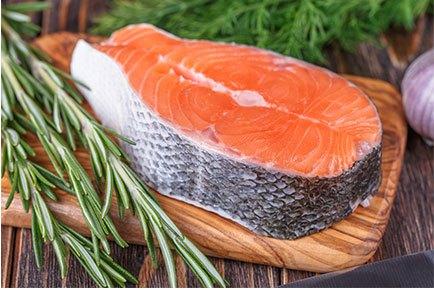
It's a sign of what the future of food will entail, and is also a huge loss for anti-GMO activists: yesterday the U.S. Food and Drug Administration (FDA) concluded that genetically modified salmon is as safe to eat, and is just as nutritious, as in any wild or farmed Atlantic salmon. While the FDA has long approved the use of genetically modified agricultural products such as corn or soy, yesterday’s decision was the first time a genetically modified animal was given the green light for human consumption.
The fish in question is AquAdvantage salmon, the product developed by Massachusetts-based AquaBounty Technologies. Genetically designed from a stock of salmon based in Canada’s Bay of Fundy, the company’s engineered salmon has been a project over 20 years in the making. According to the company, the production of its fish occur at twice the rate of salmon’s normal life cycle, is just as nutritious, takes the burden off the world’s fisheries and will help meet the world’s growing demand for animal protein.
According to the FDA, the data provided to the agency by AquaBounty, along with other peer-reviewed studies, backed up the company’s claim that its salmon was safe for eating and that the genes inserted in the fish had remained stable for several generations. In addition, the FDA scientists who reviewed the data determined that the production of such genetically modified salmon will pose no environmental threat within the United States—in a large part because the fish will be produced at the company’s facilities in Canada and Panama. But because those operations are land-based, the FDA surmised that there is almost no chance that the fish could ever escape and breed with other species of salmon in the wild.
This outcome is a victory for the biotechnology sector, and a defeat for advocates who insist that GMO-derived food products should be labeled as such in order to protect consumers. While the FDA says it will develop guidance for companies such as AquaBounty that may wish to label their products, the agency maintained that current U.S. law does not require such labeling. The guidance is currently publicly available for review and anyone can submit comments beginning on Monday, November 23.
At press time AquaBounty had no public reaction to the FDA’s decision, but other organizations have already had plenty to say about this issue. In a very pointed statement, the Consumers Union expressed “deep disappointment” in the FDA’s approval of the AquaBounty salmon product. “Consumers deserve to know what type of food they’re buying - and an overwhelming majority has told us that they want genetically modified food labeled in poll after poll,” said Dr. Michael Hansen, Senior Scientist with the Consumer’s Union in a written statement. “The decision to not require a GE label for this product takes away the consumer’s ability to make a truly informed choice.”
The 80-year-old consumer advocacy group has urged Congress to pass a bill that would require labeling for food products that are genetically modified. But considering the polarized political climate, the chance that either the House or Senate would consider such a bill lies somewhere between never and when hell freezes over. In the meantime, AquaBounty has recipes available for any consumer interested in the company’s claim that its fish is just as nutritious and tasty as other varieties of salmon sold on the market.
Watch for more biotech companies to become emboldened by AquaBounty’s victory, as the planet is expected to become home to nine billion people by 2050 and will therefore have to find new ways to feed people—many of whom will have middle-class incomes and will expect to eat the way many of us in G-7 countries have dined for generations.
Image credit: AquaBounty

Leon Kaye has written for 3p since 2010 and become executive editor in 2018. His previous work includes writing for the Guardian as well as other online and print publications. In addition, he's worked in sales executive roles within technology and financial research companies, as well as for a public relations firm, for which he consulted with one of the globe’s leading sustainability initiatives. Currently living in Central California, he’s traveled to 70-plus countries and has lived and worked in South Korea, the United Arab Emirates and Uruguay.
Leon’s an alum of Fresno State, the University of Maryland, Baltimore County and the University of Southern California's Marshall Business School. He enjoys traveling abroad as well as exploring California’s Central Coast and the Sierra Nevadas.














